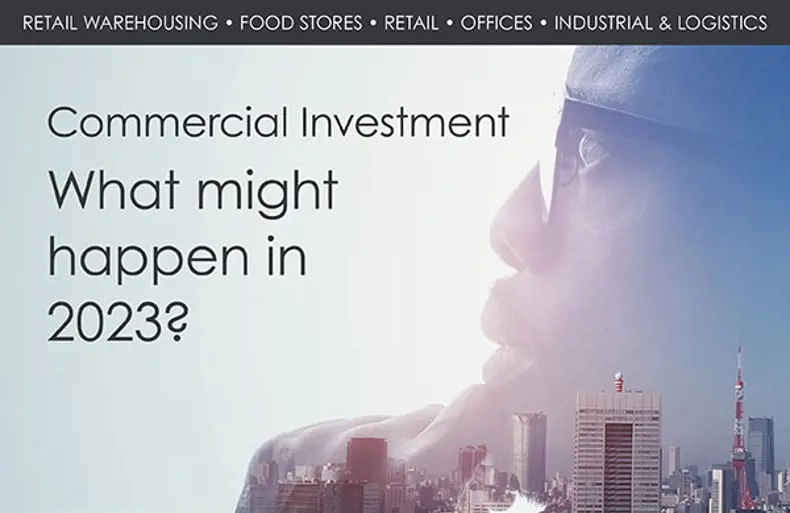Blog | Commercial Investment | Industrial & Logistics | Retail | Offices
Emerging trends in the national investment market in 2023

While at the outset of 2022, much of the economy thought we were in for a year of recovery with strong transactional activity across commercial real estate markets. It quickly became clear it would be a year of two halves, with activity markedly slowing down towards Q3 and one of the market’s least busy fourth quarters in years.
The outlook, however, as we emerge into 2023 is brighter. Each day, we get another minute or two of sunlight and, each day, we get a little bit more clarity on what the year has in store.
We’ve consulted our team of national commercial investment agents not to gaze into their crystal balls, but to provide their on-the-ground insight into what trends will carry on from 2022 into the new year, and what therefore 2023 is likely to have in store for a range of commercial real estate sectors.
How would you describe 2022 in your sector in two words?
Retail Warehousing: Haphazard & engaging
Food Stores: Looking attractive
Retail: Improving & opportunistic
Offices: Extremely challenging
Industrial & logistics: Market dislocation
Which one trend from 2022 will continue and which one will either evolve or come to an end?
Retail Warehousing
The resilience of the retail warehousing occupational market will continue despite economic and consumer headwinds. With logistic costs continuing to soar and online penetration declining, retail warehousing provides occupiers with the best and most cost-effective route to market.
One trend which is coming to an end is that most of the larger rental agreements done circa 10 to 15 years ago have now been rebased. Most of the over rent were in the larger regionally dominant schemes which had a lot of hands on asset management which worked up rental levels. Now with the removal of this overrent it enables investors to buy assets off lower rents which are sustainable for retailers.
Food Stores
Yields for food store investments moved out in the latter part of 2022 and we would expect that to stabilise, in fact, we are already seeing investors return to the market and competitive situations arise. We do, however, expert there to be a continued differential between supermarket covenants, particularly seeing yields move out for those with higher debt levels. In terms of the most popular covenants discount stores like Aldi and Lidl will continue to attract investors, alongside the mainstays of Tesco and Sainsburys, these attracting the lowest yields.
Retail
Demand will continue for large chunks of high street real estate in strong towns.
Supermarket / convenience store anchored centres will continue to thrive with potential rental increases as investors look for a resilient asset class, often with CPI-linked increases.
Mismatch on pricing between buyers and sellers will reduce transactional volumes at the start of the year, but this will ease as the year goes on.
Re-purposing department stores will become more expensive with build costs and inflation but would be necessary for the revival of the high street.
Offices
There will be a continued focus on offices with strong ESG credentials. A diminishing working from home trend as recession kicks in and staff want to be more visible will help boost the attractiveness of the market, while larger corporates in particular are also increasingly showing that they want their staff in the office more.
Industrial & logistics
The uncertainty of the end of last year will be phased out by increased competition to secure assets throughout the year once the market is comfortable with pricing readjustments. We are increasingly seeing pricing expectations between buyers and sellers meet, which means that we could start seeing much more movement soon.
The market will be less siloed than it has been previously. While you once had private equity investors, for example, looking for higher yielding multi-let industrial and funds looking for prime, there’ll increasingly be a coming together of different investor types. This chase for “yield” could well lead to yield compression across the industrial and logistics spectrum as the year unfolds.

Who will be buying in your sector in 2023 and why?
Retail Warehousing
Retail warehouse yields will be comparatively higher compared to some other sectors, therefore attracting a wide buying pool from institutions who are still active in the sector, where there is good demand for prime south east assets, through to value-add and core plus investors in more regional locations. Transaction volume will start to pick up once vendor and purchasers aspirations align.
Food Stores
Institutions will still look to buy well-let, well-located supermarkets. Smaller convenience type food stores will continue to attract property companies and private investors.
Retail
The last couple of years have seen the ownership structure of the high street change massively as institutions sold to private investors. This trend will carry on, but with a pricing mismatch between the two. We believe with the increased cost of finance private investors will be outpriced by owner-operators purchasing these assets.
Offices
Overseas buyers targeting 10+ year income streams to good covenants. On the multi-let side, private equity money from the U.S. may turn its attention to the sector once pricing is deemed sufficiently re-based. Investors will be looking to buy now while things are relatively cheap, with an expectation that many assets will become stronger as the year progresses.
Industrial & logistics
Everyone that was there before will be back – private investors, propcos, funds and private equity. However, with pricing softening there will be increased competition between investor types. We expect foreign capital market share to increase in the sector taking advantage of the relatively weak sterling.

Why will investors find your sector attractive in 2023?
Retail Warehousing
Despite current economic headwinds in the UK, and what that might mean for consumer spending and operators’ profits, the retail warehouse sector will once again prove its resilience like it did during the pandemic.
Oxford Economics is forecasting a year-on-year drop in retail spend of 6.1% in Q1 2023. But with retail warehousing having a low vacancy rate at circa 5% and occupiers pivoting towards being more grocery and discount occupier led, this will maintain investor appetite.
Food Stores
Well-let food stores benefit from less volatile rental income cycles and offer secure income during volatile markets. Fundamentally, they are more recession-proof and are a necessity in people’s day-to-day life.
Retail
Supermarkets and convenience store-led retail offer a hedge against the cost of living crisis and reduced consumer spend as customers will focus their spending on these goods. It is a resilient asset type in the market, and common to have leases with CPI–linked increases.
Pricing and rental rebasing have been happening on the high street since before the pandemic and with financial recovery over the next few years this asset type is expected to see increased value.
Beyond this, local councils have recognised the importance of adopting a flexible policy when it comes to the high street, which will potentially allow for development that was previously considered unfavourable, such as [residential?]. This paired with the drive for net zero will allow more development in an asset class that is lagging behind other asset classes such as offices when it comes to green credentials.
Offices
Significantly re-based pricing will make offices look like good value versus other sectors. Short to medium term rental growth for best-in-class product.
Industrial & logistics
The fundamentals remain strong based on supply side and occupational demand.
Our contributors:
Retail Warehousing
Archie Stead
+44 (0)207 543 6764
Food Stores
Liam Stray
+44 (0)207 543 6769
Offices
Dale Johnstone
+44 (0)207 543 6796
Portfolios
Jeremy Hodgson
+44 (0)207 543 6709
Retail
Gergo Petrovics
+44 (0)207 543 6847
Industrial & Logistics
Richard Gale
+44 (0)207 543 6755
We are here to help and if you are thinking of selling or acquiring a commercial property investment or portfolio, please do not hesitate to get in touch with a member of the National Investment Team.
Interested in more insights on the market?
The National Investment team produce various market updates throughout the year. You can keep up to date with them by clicking on the button below
Related Insights

Allsop announces next senior partner
Allsop, a leading UK property consultancy, has named Andrew Boyd as its next Senior Partner, with Scott Tyler to step down fr...

What a difference a year makes!
Business confidence has been growing although it did dip last quarter perhaps in reaction to the likelihood of tax rises in t...

Discover Norton Folgate
A New Chapter Since 2019, British Land have undertaken meticulous restoration and redevelopment efforts to honour the past...

It’s coming home: sports clubs become real estate’s biggest fans
Development can help generate lucrative long-term revenues for clubs
